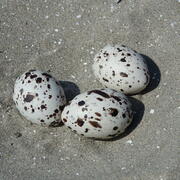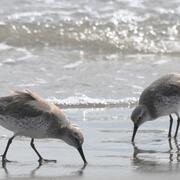Coastal
Coastal
Filter Total Items: 58
Evaluating Efficacy of Stewardship Actions for Vulnerable Gulf of America Coastal Birds Through Co-Production Between Scientists and Resource Managers
The USGS and partners will survey bird and human activity on beaches in Alabama, Mississippi, and Louisiana to determine breeding bird response to stewardship activities aimed at protecting and recovering bird populations.
Winter Shorebird Surveys of Federally Protected Bird Species Following Restoration at West Belle Headland and Trinity-East Island, Louisiana
The USGS and the Barataria-Terrebonne National Estuary Program (BTNEP) conducted post-restoration monitoring of Piping Plovers and Red Knots to better understand how birds respond to coastal restoration.
Biological Vulnerability to Hypoxia Under a Warmer Climate in the Northern Gulf
USGS researchers are a developing a modeling framework to assess climate warming impacts on hypoxia-related stress to commercially and recreationally important Gulf species.
Alabama Barrier Island Restoration Assessment at Dauphin Island
Dauphin Island, Alabama, is the only barrier island providing protection to much of Alabama's coastal natural resources. Severely impacted by repeated extreme events, like Hurricane Katrina and Deepwater Horizon oil spill, USGS and partners are conducting a joint study to evaluate the feasibility of certain alternatives to increase resiliency and sustainability of the island.
Spatial Analysis Support for Coastal Wetlands Planning, Protection and Restoration Act (Breaux Bill) Planning Activities
WARC first implemented geographic information systems (GIS) in 1980 to help monitor the nature and extent of wetland habitat changes. The center continues to use GIS, remote sensing, and other computer based technologies to address a wide range of natural resource related issues.
Geographic Information and Technical Support
USGS WARC first implemented geographic information systems (GIS) in 1980 to assist in monitoring the nature and extent of wetland habitat changes. Today, WARC geographers and support staff create, maintain, and use geospatial data to analyze restoration efforts in Louisiana.
Natural Resource Damage and Assessment (NRDA) Program Monitoring and Adaptive Management
State and Federal agencies, including USGS, are working together to assess the damage caused by the Deepwater Horizon oil spill and to determine appropriate restoration actions to restore natural resources, ecological services, and recreational services injured or lost due to the incident.
Louisiana’s Coastwide Reference Monitoring System (CRMS)
The Coastwise Reference Monitoring System was designed to monitor the effectiveness of restoration actions at individual sites, as well as across the entire Louisiana coast.
Spatial Analysis of Coastal Wetlands Planning, Protection and Restoration Act Projects
As the first federally mandated restoration program, Louisiana enacted the Coastal Wetlands Planning, Protection and Restoration Act (CWPPRA) to address Louisiana’s land loss crisis.
A Case Study Assessing the Cumulative Effects of Deepwater Horizon Restoration Projects on Barrier Island/Barrier Shoreline Ecosystem Resilience in the North-central Gulf
USGS and partners will assess the potential cumulative effects of restoration projects on the resiliency of barrier islands and barrier shorelines in the north-central Gulf.
Barriers and Opportunities for Landward Migration of Coastal Wetlands along Texas' Upper and Middle Coast
Researchers at WARC will use data and models to produce probabilistic maps of current and future wetland inundation, coastal wetland extent, and coastal and wetland trangression.
Vertical Control of Rod Surface Elevation Table (RSET) Benchmarks to Assess Implications of Sea-Level Rise within Texas Coastal Refuges
The USGS will establish Rod Surface Elevation Tables at five National Wildlife Refuges on the Texas coast. This work will support climate adaptation and resilience planning by identifying areas susceptible to loss and degradation due to sea-level rise and extreme climatic events along the Texas Gulf Coast.













